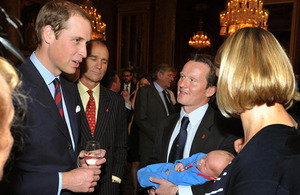Prince William honours Service personnel's Antarctic race
The Duke and Duchess of Cambridge celebrated yesterday the achievements of British Service personnel who recreated the famous Scott-Amundsen race to the South Pole.

The Duke of Cambridge talks to Staff Sergeant Viv Vicary, of The Rifles
The teams raced each other across Antarctica, covering 900 miles (1,448km) of snow and ice in 70 days to pay homage to the gruelling polar contest between Captain Robert Falcon Scott and Roald Amundsen a century ago and raise money for the Royal British Legion.
As patron of the expedition, Prince William spoke at the reception to congratulate the teams on their extraordinary achievement. He said:
I find it hugely poignant that the participants in the Scott-Amundsen Centenary Race are all British servicemen. All but one of the original members of Scott’s team were serving sailors or soldiers too.
That today’s Armed Forces can produce individuals to emulate the extraordinary feats of their forebears is something we should take great heart from.
In a rapidly changing world, it is reassuring to know that two things, at least, haven’t changed this past hundred years: the fortitude of our men and women in uniform, and that very particular British trait of always seeking to push the boundaries… or, as many gathered here would have it, to go ‘beyond that last blue mountain barred with snow, across that angry or that glimmering sea’[*].
That the race chose to support, through the Royal British Legion, Battle Back’s new centre in Lilleshall could not be more appropriate. The same levels of courage and determination demonstrated by our Antarctic heroes in 1912 and 2012 are shown each and every day by our wounded servicemen and women. Their courage and spirit simply humble me.
True to history, the Amundsen team, led by Lieutenant Colonel Henry Worsley, from The Rifles, reached the South Pole first on 9 January 2012 and the Scott team, led by Warrant Officer Class 2 Mark Langridge, from The Parachute Regiment, arrived a week later on 17 January 2012 - exactly 100 years after the original Scott expedition.
Also in the Amundsen team were Staff Sergeant Lennie Browne, from The Parachute Regiment, and Warrant Officer Class 2 Lou Rudd, from the Royal Marines. Joining Warrant Officer Class 2 Langridge in the Scott team were Staff Sergeant Viv Vicary, from The Rifles, and Staff Sergeant Kev Johnson, from The Parachute Regiment.
En route, team members paid their respects to Captain Scott and his four comrades who perished on the journey back from the South Pole. Their tragic loss is seared in the nation’s memory as an enduring narrative of duty and sacrifice.
The royal couple chatted to team members and their families about their epic challenge at the reception, which is one of three events they are attending ahead of their first wedding anniversary on Sunday.
Lieutenant Colonel Worsley said:
There is a history of royal patronage for major polar expeditions and we’re honoured to have the Duke of Cambridge as patron in this important centenary year.
It’s been an absolute privilege for us to be able to follow in the footsteps of the great Antarctic explorers. The journey was formidably demanding, but so worthwhile knowing that we are raising money for the Royal British Legion’s fantastic work.
What we, as a British Army team, have gone through to reach the Pole is nothing compared to what injured and disabled fellow servicemen and women will go through for the rest of their lives.
National President of the Royal British Legion, Lieutenant General Sir John Kiszely, said:
This extraordinary Army expedition was a pursuit to recreate one of the most challenging and difficult journeys ever attempted by man.
Even with modern equipment, it tested the courage, ability, strength and endurance of the team members to their limit, and in doing so demonstrated all that is admirable about our Armed Forces.
The Royal British Legion is proud to be supported by the Scott-Amundsen Centenary Race, which is raising vital funds towards their £30m commitment to the new Battle Back Centre in Lilleshall to help wounded, injured and sick servicemen and women on their personal journeys of recovery.
The centre is focused on rebuilding confidence, ability and motivation through adaptive sports and adventurous training. It is a place where even small steps can feel like great leaps of accomplishment for young men and women who are used to being at the peak of physical fitness.
Sapper Clive Smith, a 26 year-old, double-leg amputee from 33 Engineer Regiment (Explosive Ordnance Disposal), was seriously injured in an IED blast in Afghanistan in 2010. He recently attended the Battle Back Centre, and was at the reception yesterday. He said:
It was an honour to meet the Duke and Duchess of Cambridge. I spent a while chatting to them about my time at the Battle Back Centre. For wounded Service people like me, the centre will make all the difference in recovery.
I took part in activities like wheelchair basketball and bowling, and managed to scale a wall while rock climbing, which was brilliant.
The encouragement I received from the staff and others on the course was fantastic, and none of this would have been possible without the important work the Legion do supporting the Armed Forces.
* From the poem The Golden Journey To Samarkand by James Elroy Flecker